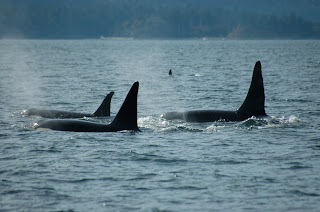Call Me Ishmael
 |
| Southern Resident Orcas |
What creature is more iconic of the Pacific Northwest than the Orca? These largest of the Dolphin family remind us of a time before the arrival of Europeans. Considered the guardian of the sea, they were revered by Native Americans and the most admired of all the whales. They were respected for their strength and family bonds and appeared in the crests of many clans. If someone drowned, it was believed he went to join the Orcas.
 |
| J Pod Family |
We humans have been drawn to close encounters with these playful and sentient creatures. When this compulsion got out of hand, including captivity for circus acts, laws had to be passed to compel us to leave them alone. We have been "loving them to death."
It's not just their size and family life that intrigues us. A detail that adds to our fascination is an apparent evolutionary U-turn. (Before getting riled at the mention of the word, you might read an excellent synopsis of evolution in the Book of Genesis, chapter 1, verses 20-23. Evolution is elegantly described as the fifth day of creation.) We normally think of land animals arising from more primitive aquatic life forms. In the case of whale ancestry, the fossil record and their anatomy point to an ancient hoofed, dog-like land animal that returned to the sea.
 |
| K and L Pods Family Shot |
Yet, the whales have eluded me. The Whale Museum provides charts documenting Orca sightings "east of Deception Pass." I am east of Deception Pass, but after 23 years, I have not experienced a single sighting. I suppose I could join one of those whale watching cruises with the tourists, but it would not be satisfying. It also misses the point. The greatest thrill comes from an unexpected encounter. Despite failure, I have not given up on my quest. One of these days, a pod of Orcas or an inquisitive Gray will venture into upper Skagit Bay and I will be here to see it. Perhaps for me, 2011 will be the Year of the Whale.
With my thanks, the photographs here were provided by naturalist, author and photographer Monika Wieland. Her blog Orca Watcher is one of my favorites. From her San Juan Island vantage, she is literally on a first name basis with the members of the three Southern Resident Orca families.
For more information about the Southern Resident Orcas, the Seattle Aquarium provides interesting facts, conservation tips and a comprehensive list of links.
Adapted from an article originally posted at Windows Live Spaces.